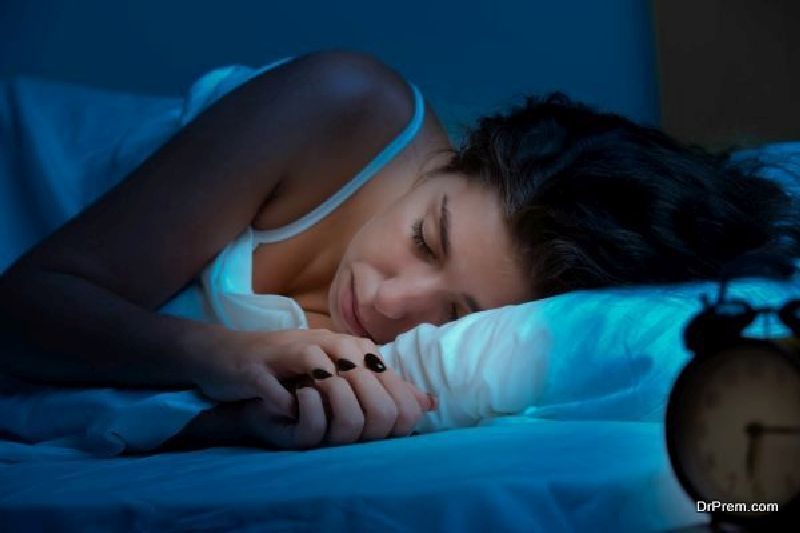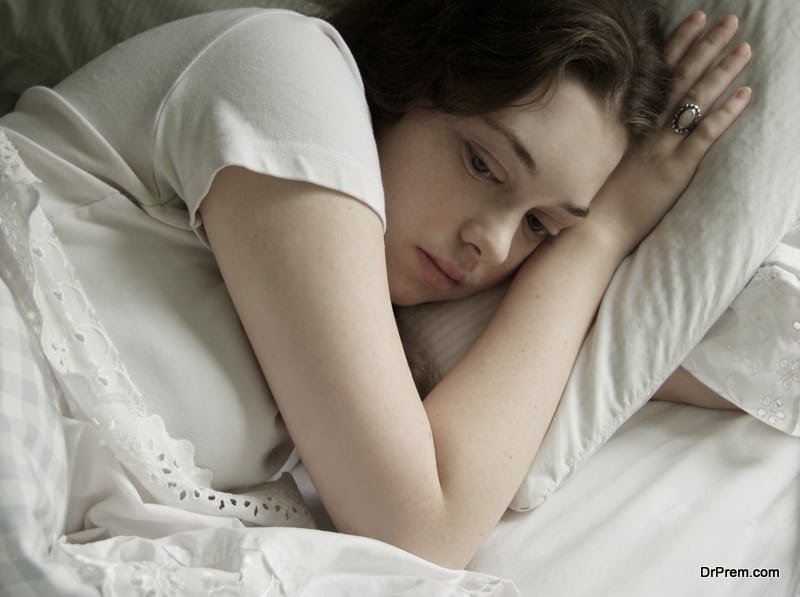One in three people suffer from mild insomnia. Poor sleep quickly develops into poor sleep habits, only worsening this condition. Some individuals require a sleep study to diagnose other underlying issues such as sleep apnea. But for those suffering from mild insomnia or sleep disturbances, there’s hope! Here are 5 innovative ways of treating insomnia and achieving a quality night’s sleep without medication.
1. Develop Healthy Sleep Habits

Healthy sleep habits are the first step in achieving a quality night’s sleep. That’s because your body is like a machine and thrives on routine and consistency. Before you can adopt healthy sleep habits, it’s important to recognize unhealthy ones. These include going to bed and waking at different times, sleeping in an uncomfortable position, and over stimulating your mind and body prior to sleep.
While it’s not always possible to go to bed and wake up at the same time every single day, you can work to develop a routine. Once your body becomes accustomed to this consistent sleep pattern, you’ll find yourself getting tired at the same time each night and waking in the morning without the help of an alarm. Tuck yourself into bed and get your day started around the same time, when possible. If you tend to fall asleep on the couch or in a reclining chair, your sleep is disrupted once you wake up and move into the bedroom. Not to mention, living room furniture is made for relaxation, not sleep.
When you feel yourself getting sleepy or nodding off, move into the bedroom immediately. Don’t allow yourself to fall asleep in uncomfortable or non-traditional positions or places. Try reading a book, listening to some soothing music, or taking a nice hot shower or bath before bed. Avoid loud noises, large crowds, or stressful situations prior to sleep. These things will boost your adrenaline and keep your mind and body from entering a state of relaxation, designed for sleep.
2. Avoid Certain Foods and Drinks
 What you eat and drink prior to bedtime can also affect your sleep. Indulging in alcohol or cigarettes are two of the worst things insomnia sufferers can do. That’s because both nicotine and alcohol have natural stimulants your body and actually reduce your REM cycles. The body’s REM (rapid eye movement) cycle of sleep is the stage of sleep where your body is most relaxed. It occurs roughly 90 minutes after falling asleep and is where your mind dreams and offers your body restorative benefits.
What you eat and drink prior to bedtime can also affect your sleep. Indulging in alcohol or cigarettes are two of the worst things insomnia sufferers can do. That’s because both nicotine and alcohol have natural stimulants your body and actually reduce your REM cycles. The body’s REM (rapid eye movement) cycle of sleep is the stage of sleep where your body is most relaxed. It occurs roughly 90 minutes after falling asleep and is where your mind dreams and offers your body restorative benefits.
Alcohol and nicotine can actually prevent you from ever entering a REM cycle, which means you’re not getting the many benefits sleep offers. These negative effects can even carry over into daytime, creating fatigue, poor concentration, and dizziness. But what you drink isn’t the only factor to consider. Eating meals that are rich, heavy, or high in sugar right before bed can also disrupt your body’s natural sleep patterns. That’s because foods high in sugar, carbohydrates, or fat raise your blood sugar levels and makes it difficult for both your mind and body to wind down.
3. Revamp Your Bedroom
 Your bedroom should act as your sanctuary for sleep. That means eliminating the clutter and creating a space that is warm, comforting, and soothing. Eliminate noise and light by investing in room darkening shades and a sound machine. Room darkening shades help block out any light from outside, creating a dark space perfect for sleep. If you have a television or alarm clock in your bedroom, try covering any illuminated time or displays.
Your bedroom should act as your sanctuary for sleep. That means eliminating the clutter and creating a space that is warm, comforting, and soothing. Eliminate noise and light by investing in room darkening shades and a sound machine. Room darkening shades help block out any light from outside, creating a dark space perfect for sleep. If you have a television or alarm clock in your bedroom, try covering any illuminated time or displays.
Sound machines offer soothing sounds like running water and nighttime outdoors. White noise is said to help people achieve better sleep, faster. Restrict your bedroom for sleeping only. This means don’t bring work to bed, be it your computer, tablet, or cell phone. Screen time is attributed to disturbed sleep and trouble falling asleep. Too much television or time on your cell phone or tablet prior to sleep stimulates your mind and body.
When it’s time for rest, your internal clock naturally lets your body know and signals sleep with the release of a sleep-inducing hormone known as melatonin. Without this, you’ll have a difficult time falling asleep. The blue light emitted by these devices also alerts your brain and confuses your body into thinking it should be awake.
4. Try Unconventional Methods

For those suffering from insomnia but opposed to taking medication, there are some natural alternatives that can help induce sleep and help your mind and body relax. Aromatherapy is commonly used to treat all types of ailments and illnesses and can also be very effective for treating insomnia. Lavender and chamomile are two of the most comment essential oils used to induce sleep. Both scents have calming undertones that help relax users and are considered natural sedative. A few drops of oil on your pillow, in your tea, or used in a diffuser can work wonders for your sleep patterns.
The use of cannabis and medical marijuana to help treat insomnia is growing in popularity. CBD is a natural cannabinoid that claims to reduce anxiety and calm the nerves. You can learn more about the marijuana industry here. Other unconventional methods for achieving sleep include drinking warm milk before bed, ingesting a tablespoon of apple cider vinegar, and even hypnosis.
5. Find the Perfect Sleep Position
 Although it’s difficult to control your sleeping position once you fall asleep, you can design your bed with comfort in mind. This means investing in a quality pillow for your head, a body pillow to help support your legs and lower back, and a quality mattress.
Although it’s difficult to control your sleeping position once you fall asleep, you can design your bed with comfort in mind. This means investing in a quality pillow for your head, a body pillow to help support your legs and lower back, and a quality mattress.
If your body is tense or uncomfortable at rest, it will disrupt your sleep and could lead to strained or sore muscles in the morning. It may take some time for you to find the perfect pillow. There are many different types including foam, cotton, and down (feather). If your neck needs adequate support, try a firmer pillow. Body pillows are great for stabilizing your lower back and also offer comfort for those individuals who don’t like sleeping alone.
There are countless mattresses on the market also that are adjustable and form to your body. All of these elements can help you achieve the best position for sleep, allowing your body to rest and wake free from pain or discomfort.
You may not even realize that you’re suffering from insomnia. But if you wake feeling tired, sore, or disorientated, you may not be getting the quality night’s sleep you think you are. Try making some of these changes and you’ll be surprised by how well-rested you feel.
Article Submitted By Community Writer




